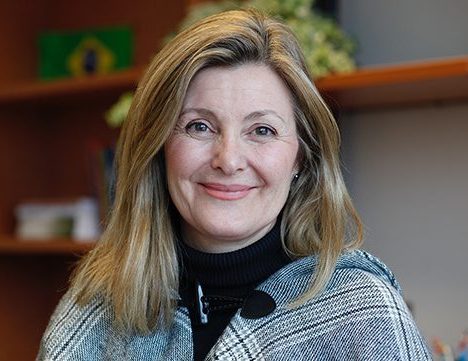Adriana Lacerda, an associate professor in the École d’orthophonie et d’audiologie at the Université de Montréal, recently joined the cinEXmedia partnership as a researcher.

William Pedneault-Pouliot
The researcher Adriana Lacerda, who has just joined cinEXmedia, hopes to bring to the partnership her vast research expertise in audiology, which is based on “promoting auditory health and preventing hearing loss, but also on communication disorders linked to the loss of hearing”, she explains.
These issues have been at the heart of her research since the beginning of her academic career at the Universidade Tuiuti in Paraná, Brazil. “I have always been interested in auditory health, because it is a phenomenon at the heart of communication”, she continues. “One has to hear well to communicate well; otherwise inclusion in groups and social participation can prove difficult”.
In Quebec, Lacerda has developed fruitful collaborations within institutional, community and leading international networks. Her nomination in March 2019 to the position of director of the Hearing and Aging research laboratory at the Centre de recherche de l’Institut universitaire de gériatrie de Montréal (CRIUGM) demonstrates this. This organisation’s mission consists in seeking to “better understand the aging process from a holistic view of the interactions between the body, the brain and the environment, and to develop innovative solutions which promote the health and well-being of the elderly”, she remarks.
Lacerda, moreover, laments the fact that issues connected to auditory health are so little explored in scientific research in Quebec. “We don’t pay enough attention to audiology issues. Much is lacking with respect to all the interventions aimed at optimising communication or improving services for elderly people who are hard of hearing, and my own research interests have been particularly tied up with this”.
This is why Lacerda has numerous projects on the go within different networks, from her research into the impact of hearing aids on the quality of life of the elderly to her efforts to better equip future attendants of recipients with respect to communicating with elderly people with hearing problems. She is also part of a “living laboratory” project entitled “Breaking Social Isolation for the Elderly in Côte-des-Neiges: A Living Lab Approach” whose communication component, she explains, seeks to “demystify the communicational challenges specific to aging and to bring minority communities and generations together”.
The Beginning of an Abundant Collaboration with cinEXmedia
The idea of joining the ccinEXmedia partnership came to Adriana Lacerda in the course of working with Audition Québec, a community organisation whose mission is to assist and encourage the social inclusion of people who are hard of hearing. “Audition Québec had already somewhat inventoried movie theatres with hearing devices for people who are hard of hearing”, Lacerda relates, “but the organisation did not have more information on the use of these cinemas or the challenges associated with them”.
That was when she thought of professor Santiago Hidalgo and his team, not only to inventory more assiduously the movie theatres adapted to hard of hearing customers, but also to make customers – and staff – aware of how to use this equipment. “Our objective”, she relates, is to work together with the goal of making movie theatres more accessible and equitable, whether they are commercial or non-commercial, as is the case with Long-term Care Centres (CHSLD)”.
This initiative opened the door to more profound thinking about the intersectoral possibilities of joining the disciplines audiology and cinema and audiovisual studies. “We don’t really have conclusive data on the therapeutic benefits of cinema for an aging population which needs to participate in society and to have interactions with different age groups”, she points out. “There are a lot of new projects we could develop together in order to explore all the advantages and benefits of cinema for social participation and optimising people’s quality of life”.
This is the case in particular with the “Living Lab” project in Côte-des-Neiges, in which Lacerda was already involved. “We’re hoping that Santiago [Hidalgo] and his team will participate in a second phase of the laboratory”, she remarks, “because that would give us the opportunity to develop new health-culture intersectoral projects. There is great potential for social innovation with these Living Labs. Audiovisual technology also helps enormously, generally speaking, in raising the general public’s awareness of the issues around auditory health”.
This new intersectoral partnership between Adriana Lacerda and cinEXmedia will encourage an encounter between two disciplines which traditionally operate apart, thereby opening up a wide range of possibilities both for audiology and for cinema and audiovisual studies.

